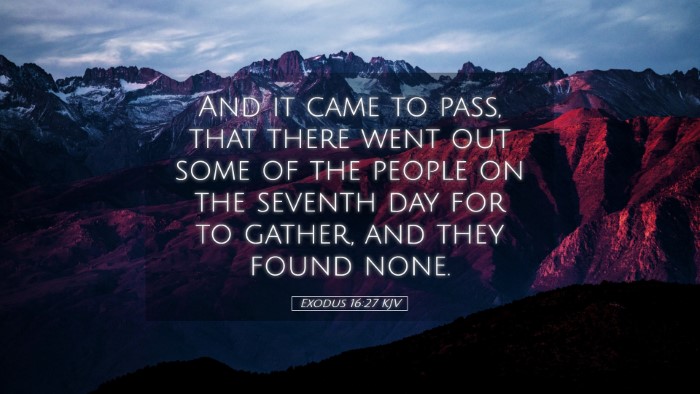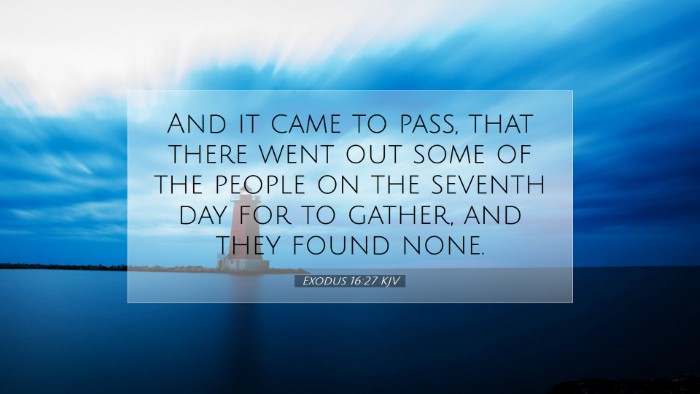Exodus 16:27 - Commentary
Verse: "And it came to pass, that there went out some of the people on the seventh day for to gather, and they found none."
Introduction
This verse is situated in the broader narrative of the Israelites' journey through the wilderness, where God provides for their needs through manna. This particular verse highlights the disobedience of some among the people of Israel regarding God's command concerning the Sabbath. The mention of "the seventh day" brings forward significant theological implications on obedience, rest, and God's provision.
Contextual Overview
Exodus 16 records the miraculous provision of manna, a heavenly food supplied by God to sustain the Israelites during their desert wanderings. After being freed from Egyptian bondage, the Israelites found themselves in dire circumstances, which prompted complaints about food. In response, God promised to provide them with manna (Exod. 16:4). The gathering of this bread from heaven came with specific instructions, particularly about gathering twice as much on the sixth day in preparation for the Sabbath.
Key Insights from Commentaries
Matthew Henry
Matthew Henry notes that the insistence of some individuals to gather manna on the Sabbath illustrates a lack of trust in God's instructions and provisions. He emphasizes that this behavior represents a critical transgression against God's commandment to rest on the Sabbath, a day set apart for both spiritual and physical rejuvenation. Henry elaborates on the spiritual significance of the Sabbath, not merely as a day off, but as a divine ordinance meant for the follower's benefit and communion with God.
Albert Barnes
Albert Barnes points out that the actions taken by some to gather manna on the seventh day highlights the human tendency to doubt God's faithfulness. He points out the stark contrast between God's provision and the people's response. Barnes argues that this event serves as a broader metaphor for God's unchanging character and His expectations of obedience from His people. He warns that such disregard of God's commandments can lead to spiritual consequences, specifically in the loss of peace and assurance.
Adam Clarke
Adam Clarke takes a practical approach by suggesting that this incident serves as a reminder of the importance of a disciplined life in faith. Clarke infers that the Israelites' failure to rest on the Sabbath is a reflection of their still-developing understanding of God's nature and a lack of fidelity to His directives. Moreover, he highlights the significance of the Sabbath in Christian practice as both a moral commandment and an opportunity for worship and renewal. Clarke encourages readers to view the Sabbath as a means of connecting with God rather than merely a ritualistic obligation.
Theological Implications
- The Nature of God’s Provision: The refusal to heed God's command serves as a lesson in his abundant provision and the necessity of faith in receiving it.
- Rest as Commanded by God: The Sabbath is more than just a break; it is a divine institution intended for human flourishing and a deepening of one’s relationship with God.
- Human Disobedience: This passage reveals the ongoing challenge of human rebellion against divine commandments, prompting theological reflection on sin and grace.
Practical Applications
The lessons from Exodus 16:27 extend beyond ancient Israel to contemporary Christian practice:
- Embrace the Sabbath: Christians are called to honor the Sabbath, recognizing it as a day for worship and reflection, while trusting in God's provision.
- Trust in God's Word: Believers should cultivate a mindset that trusts in God's instructions, even when circumstances make obedience difficult.
- Restoration and Renewal: The Sabbath should be viewed as a necessity for spiritual, emotional, and physical health, a time to recalibrate one's focus on God.
Conclusion
Exodus 16:27 serves as a poignant reminder of the call for obedience in the life of faith. The challenges faced by the Israelites and their subsequent choices illustrate a vast array of theological and practical lessons relevant to our lives today. By engaging deeply with this text, pastors, theologians, and students alike can draw insights that encourage greater fidelity to God and His commands while embracing the gracious provision of a Sabbath rest.


